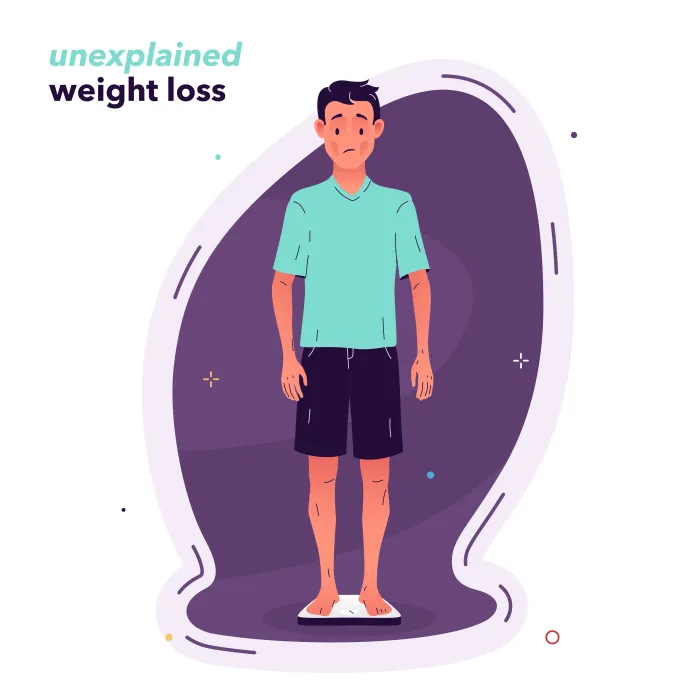Unexplained Weight Loss: When You Should Be Concerned
Learn about unexplained weight loss, its causes, the 5% rule, red flag symptoms, and when you should see a doctor.

Written by Dr. J T Hema Pratima
Reviewed by Dr. Shaik Abdul Kalam MD (Physician)
Last updated on 13th Jan, 2026

Introduction
Unexplained weight loss can feel like a hidden victory until you realise you didn't do anything to achieve it. While many people strive to lose weight, dropping pounds without changes to your diet or exercise routine is often a red flag, not a cause for celebration. This unintentional weight loss can be your body's way of signalling an underlying health issue that needs attention. From thyroid problems and diabetes to digestive disorders and stress, the causes are varied and sometimes serious. This guide will help you understand what qualifies as concerning weight loss, explore the potential medical conditions linked to it, and, most importantly, outline the clear signs that it's time to see a doctor. Recognising these signals early is a crucial step towards protecting your health.
What Qualifies as Unexplained Weight Loss?
Unexplained weight loss, or unintentional weight loss, is defined as a significant drop in body weight that occurs without conscious effort through dieting, increased exercise, or other lifestyle changes. It's not about minor fluctuations of a pound or two, which are normal, but a noticeable and persistent decline.
The 5% Rule: A Medical Benchmark
Medical professionals often use a specific benchmark to determine clinical significance. A loss of more than 5% of your total body weight over a period of 6 to 12 months is generally considered unexplained and warrants medical investigation. For example, if you weigh 180 pounds (82 kg), losing 9 pounds (4.1 kg) over six months without trying would be a clear signal to consult a doctor.
Common Causes of Unintentional Weight Loss
The mechanisms behind unexplained weight loss typically fall into two categories: your body is either using more energy than usual, or it's not absorbing nutrients properly from the food you eat.
Endocrine and Metabolic Disorders
Your endocrine system regulates metabolism. When it's out of balance, it can dramatically affect your weight.
Hyperthyroidism (Overactive Thyroid)
An overactive thyroid gland floods your body with hormones that accelerate your metabolism. This leads to rapid calorie burning, causing weight loss even with a normal or increased appetite. Other symptoms include nervousness, heat intolerance, and a rapid heartbeat.
Diabetes
Uncontrolled type 1 diabetes, and sometimes type 2, can cause severe weight loss. When your body can't use glucose for energy due to a lack of insulin, it starts burning fat and muscle instead, leading to weight loss. Excessive thirst and urination are classic accompanying signs.
Gastrointestinal and Digestive Issues
Conditions that impair your body's ability to absorb nutrients can lead to weight loss and malnutrition.
Coeliac Disease and IBD
Coeliac disease (an immune reaction to gluten) and Inflammatory Bowel Diseases like Crohn's disease and ulcerative colitis damage the lining of the gut. This prevents the absorption of nutrients, leading to unexplained weight loss, diarrhoea, and abdominal pain.Consult a Specialist for Personalised Advice
Chronic Pancreatitis
The pancreas produces enzymes crucial for digestion. Chronic pancreatitis impairs this function, leading to malabsorption and weight loss, often accompanied by persistent abdominal pain that radiates to the back.
Chronic Infections and Inflammatory Conditions
Long-standing infections like tuberculosis, HIV, or parasitic infections force your body into a hypermetabolic state, burning calories to fight the illness. Other inflammatory conditions like rheumatoid arthritis can also decrease appetite and increase energy expenditure.
The Psychological Connection: Depression and Anxiety
Mental health is deeply intertwined with physical health. Depression can lead to a loss of appetite and disinterest in food preparation and eating. Severe anxiety can increase your metabolic rate and cause nervous energy expenditure. The psychological toll can make maintaining a healthy weight a significant challenge.
Neurological Conditions
Diseases like Parkinson's and Alzheimer's can lead to weight loss for several reasons, including difficulty swallowing, forgetfulness (forgetting to eat), and increased energy needs due to muscle rigidity or tremors.
Medications and Side Effects
Certain prescription drugs can have side effects that contribute to weight loss. These include medications for ADHD (stimulants), chemotherapy, some antidepressants, and drugs for thyroid conditions. They can suppress appetite, cause nausea, or alter taste perception.
The Critical Question: When Should You See a Doctor?
If you've experienced significant unintentional weight loss as defined by the 5% rule, it is time to schedule an appointment with a healthcare provider. Do not adopt a "wait and see" approach.
Red Flag Symptoms That Demand Immediate Attention
Seek prompt medical attention if your weight loss is accompanied by any of the following:
• Fever or persistent night sweats.
• Persistent abdominal pain or difficulty swallowing.
• Shortness of breath, chest pain, or palpitations.
• Neurological changes like numbness, confusion, or vision changes.
• Blood in your stool, vomit, or when you cough.
• Extreme fatigue that doesn't improve with rest.
If symptoms persist beyond two weeks, consult a doctor online with Apollo24|7 for further evaluation and to determine the next best steps.
What to Expect During Your Doctor's Visit
Your doctor's goal will be to find the root cause. The process will start with a conversation and likely be followed by tests.
The Medical History: Your Doctor's First Clue
Be prepared to answer detailed questions:
• How much weight have you lost and over what period?
• Have your diet, appetite, or swallowing habits changed?
• Are you experiencing any other symptoms (e.g., fatigue, pain, changes in bowel habits)?
• What medications, including over-the-counter and supplements, are you taking?
• What is your personal and family medical history?
• Have you been under significant stress or felt down lately?
Diagnostic Tests: Finding the Root Cause
Based on your history, your doctor will order targeted tests. These may include:
• Blood tests: A Complete Blood Count (CBC), thyroid function tests (TSH), liver and kidney function panels, blood sugar (glucose) tests, and tests for inflammation (e.g., ESR, CRP). Apollo24|7 offers convenient home collection for comprehensive blood tests like these, making the process easier.
• Imaging: A chest X-ray or CT scan to look for infections, inflammation, or tumours.
• Urinalysis: To check for infections, diabetes, and kidney problems.
• Other procedures: Like an endoscopy or colonoscopy if a GI issue is suspected.
Conclusion
Unexplained weight loss is a powerful message from your body that should never be ignored. While it's tempting to brush it off or even welcome it, doing so can allow a potentially serious condition to progress. Understanding the common causes—from metabolic disorders like hyperthyroidism and diabetes to mental health challenges like depression—empowers you to have an informed conversation with a healthcare professional. Remember, the 5% rule is a helpful guideline: if you've lost a significant amount of weight without trying, it's not a time for self-diagnosis but for professional evaluation. Taking action by consulting a doctor is the most important step you can take towards addressing the root cause and safeguarding your long-term health and well-being.
Consult a Specialist for Personalised Advice
Consult a Specialist for Personalised Advice

Dr. Mainak Baksi
General Practitioner
13 Years • MBBS , MD (MPH)
Howrah
Mainak Baksi Clinic, Howrah
(50+ Patients)

Dr Suseela
General Physician
5 Years • MBBS
Bengaluru
Apollo Medical Center, Marathahalli, Bengaluru

Dr. Shaik Abdul Kalam
General Practitioner
3 Years • MD (Physician)
Visakhapatnam
Apollo 24|7 Clinic - Andhra Pradesh, Visakhapatnam
(175+ Patients)

Dr. Mohammed Kamran
General Practitioner
5 Years • MBBS, FIDM
Nashik
Apollo 24|7 Clinic - Maharashtra, Nashik

Dr. Jawwad Mohammed Kaleem
General Practitioner
4 Years • MBBS
Hyderabad
Apollo 24|7 Clinic, Hyderabad
Consult a Specialist for Personalised Advice

Dr. Mainak Baksi
General Practitioner
13 Years • MBBS , MD (MPH)
Howrah
Mainak Baksi Clinic, Howrah
(50+ Patients)

Dr Suseela
General Physician
5 Years • MBBS
Bengaluru
Apollo Medical Center, Marathahalli, Bengaluru

Dr. Shaik Abdul Kalam
General Practitioner
3 Years • MD (Physician)
Visakhapatnam
Apollo 24|7 Clinic - Andhra Pradesh, Visakhapatnam
(175+ Patients)

Dr. Mohammed Kamran
General Practitioner
5 Years • MBBS, FIDM
Nashik
Apollo 24|7 Clinic - Maharashtra, Nashik

Dr. Jawwad Mohammed Kaleem
General Practitioner
4 Years • MBBS
Hyderabad
Apollo 24|7 Clinic, Hyderabad
More articles from Weight Loss
Frequently Asked Questions
1. How fast is too fast for unexplained weight loss?
Rapid unintentional weight loss is especially concerning. Losing 1–2 pounds per week consistently without effort is a definite sign that you should see a doctor. The speed can often correlate with the severity of the underlying condition.
2. Can stress and anxiety really cause you to lose weight?
Absolutely. Chronic stress and anxiety trigger the release of cortisol and adrenaline, hormones that can suppress your appetite, increase your metabolic rate, and lead to nervous energy burning (like fidgeting), all contributing to unexplained weight loss.
3. I'm losing weight but my appetite is normal or even increased. What could that mean?
This is a classic sign of conditions that dramatically increase your metabolism. Hyperthyroidism and uncontrolled diabetes are prime examples. Your body is burning calories at such a high rate that even a good appetite can't keep up, leading to weight loss.
4. What are the first tests a doctor will do for unexplained weight loss?
The first steps usually involve basic blood work (CBC, metabolic panel, thyroid test, blood sugar) and a urinalysis. These non-invasive tests can quickly screen for many common causes like anaemia, diabetes, thyroid disorders, and kidney or liver issues.
5. Could it be cancer if I have no other symptoms?
While unexplained weight loss can be an early sign of certain cancers, it is rarely the only sign. However, it is a significant enough symptom to warrant a medical evaluation to rule out cancer and other serious conditions, even in the absence of other obvious symptoms.




